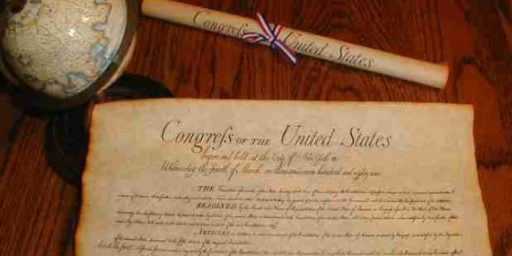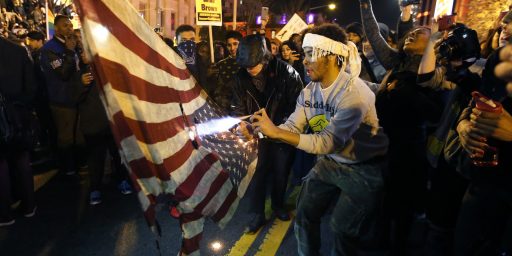Censorship?
I don’t want to get too far into the Koran burning fiasco, as James and Doug have covered it admirably. Apparently the service provider for Dove World Outreach Center has pulled its web pages down due to the kerfuffle over Koran burning, as they have every right to do.
What I would like to do is pose a question that this tweet from Matthew Stinson made me think of: Is censorship strictly a government phenomenon or is it censorship when a private company does it?
For whatever reason, I’ve always thought the answer to that question is no because I think of censorship as being unconstitutional and private companies aren’t bound by it. It might be a semantic argument, but anybody got any thoughts on this? Lawyers perhaps?






It could be censorship of a type, I suppose, but it’s not censorship with remotely the same moral force of when the government does it. Seeing as how Rackspace owns the servers, they are free to enforce whatever policies they see fit.
I do worry a little about corporate censorship wherein someone with controversial ideas can be shut out simply because nobody wants to provide them with services, but it’s in a different league from the government coming down on people with unpopular ideas or preventing them from having their say. And I’m not sure anything can be done about it, really, without infringing on a business’s right to do business with who they want. We prevent them from some forms of discrimination, so I suppose would could protect Racists or Terrorist-supporters or whatever the same way that we protect ethnic minorities if it came down to it.
I think we do prevent TV stations from refusing to run ads from Democrats or Republicans specifically. Even then, though, they can refuse to run an ad on subjective measures such as tone. I remember something about CBS and the Superbowl and Tim Tebow where a corresponding ad was declined for presentation rather than viewpoint. It’s getting kind of late and I’m too lazy to look it up, however.
Strictly speaking, both a government and a nongovernment entitiy can censor, if by ‘censor’ we mean (to simplify) preventing the expression of an opinion. There’s nothing wrong with writing a sentence like
Nobody should confuse that with government censorship, though no doubt Jones would start screaming First Amendment.
I suppose one could make the distinction this way: A nongovernmental entity censoring you only extends to the means of dissemination that it controls; a government censoring you is censoring in toto, i.e., it’s ban extends to every means of dissemination, public or private. (And, of course, in our country, the former does not fall within the purview of the First Amendment, while the latter does.)
I think censorship is entirely a government activity; the use of it to describe entirely private activity is a rhetorical device.
I’m with PD Shaw. We do lack a good term for a non-governmental body’s shutting down a message though.
@PD
And I, as a matter of plain English, think you’re wrong.
Is there a good blog acronym to express something like “I know that nobody cares, but”?
IKTNCB I side with sam. Especially in cases where the speech-limiting private entity controls the only *relevant* medium, censorship by public or private actors feels the same to the speaker.
For example, suppose I perform on a radio show and I come up with a racy bit. I’m advised that there’s no way this will pass muster with the FCC; that’s censorship. Fine. Now suppose I wait a few years until the rules change and try again. This time I hear from Clear Channel that the bit doesn’t conform to their standards & practices so my station won’t air it on it’s own authority. Somehow that’s not censorship?
Censorship is fundamentally about the coercive influence of someone who controls a medium over someone who would like to use it. We’re protected (to an ever-evolving extent) against government censorship. That doesn’t mean the other kind doesn’t exist.
Censorship is not just a government phenomenon and why it’s so important to have net neutrality.
I’ve always understood the term to apply to government suppression of speech. I wonder, though, whether we’re at the point where corporations are large enough to start applying the term to them.
If, for example, Google decided to ban speech expressing a certain viewpoint, they could effectively block it from the Internet, which is the primary medium for getting information out. They own the most popular search engine, most popular video service, etc.
We were once in a similar situation with television, with three networks effectively controlling speech. And I believe there were successful lawsuits saying, in essence, that they couldn’t censor on the basis of the content of speech. But they’re quasi-governmental since they operate the “public airwaves” under FCC license.
I might be willing to consider the use of the term when applied to a medium that had a monopoly on the means of transmission, particularly if that monopoly existed through governmental regulation. At present, Google does not hold a monopoly, in fact is being challenged by numerous other media. So, I’d still see it as a private business decision.
If a cable TV company decided to not carry a particular program or channel and that company had exclusive licensing, then I think ‘censorship’ is pretty accurate. If there are alternative cable TV companies available, even if accessing them entailed additional costs, then no.
sam, please quit censoring my ideas.
Let’s look at a concrete example: suppose you had a well-produced TV ad that promoted relaxing the country’s drug laws on marijuana. The ad is politically-oriented — it doesn’t make health claims about the benefits of smoking pot or show people using the drug. You have lots of money to pay for showing the ad, and the money comes from a legit source.
Now you try to get it on national TV. Is it “censorship if CBS/NBC/ABC/Fox” refuse to show it (and, based on previous history, they probably would refuse)?
All excellent answers. I guess the distinction I’ve always made is that the government can use force and private actors can’t. But James makes a good point regarding Google and there might be a point where private actors, while not able to use force, might be able to use an equivalent.
I brought up the marijuana ad example to illustrate that, to some extent, we already are (and have been for some time) at a point where private actors, such as the major TV networks, engage in what could reasonably be called “censorship”.
“sam, please quit censoring my ideas.”
Sorry, PD, I was particularly cranky this morning. Live a long life, but don’t get old, ok?
I wasn’t at all upset; I was amusing myself with the Humpty Dumpty rule of language.